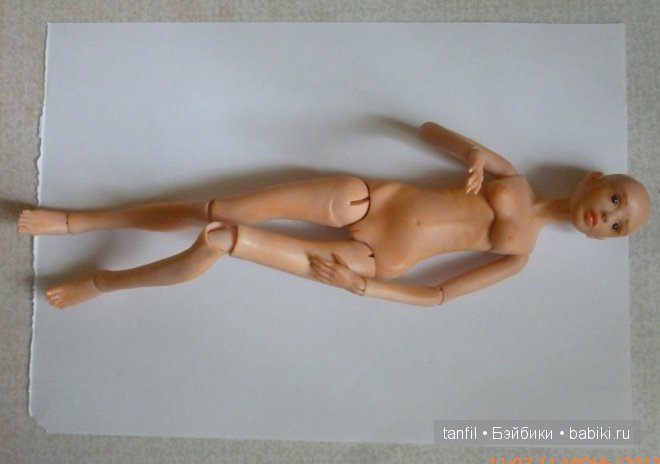-–убрики
- техника исполнени€ желаний (24)
- декор (4)
- полезное (2)
- домашний огород (2)
- заработать в интернете (3)
- книги,аудиокниги (3)
- кулинари€ (130)
- выпечка (25)
- грибы (2)
- заготовки на зиму (6)
- заготовки на зиму (4)
- закуски (20)
- колбаса в домашних услови€х (7)
- м€сные блюда (19)
- салаты (2)
- способы засолки сала (9)
- супы (2)
- рукоделие (31)
- рыбные блюда (20)
- засолка рыбки разной и маринады (14)
- стихи (2)
- фоамиран (5)
- шарнирные куклы (9)
- шитьЄ моЄ (20)
-ѕоиск по дневнику
-ѕодписка по e-mail
-—ообщества
-—татистика
ƒругие рубрики в этом дневнике: шитьЄ моЄ(20), фоамиран(5), техника исполнени€ желаний(24), стихи(2), рыбные блюда(20), рукоделие(31), полезное(2), кулинари€(130), книги,аудиокниги(3), заработать в интернете(3), домашний огород(2), декор(4)
ѕластика (люба€) аркасна€ кукла и все о ее изготовлении |
Ёто цитата сообщени€ Ѕайкалочка_10 [ѕрочитать целиком + ¬ свой цитатник или сообщество!]
јвтор –апунтик.
ƒальше слова автора
Ќи в коем случае не хочу выгл€деть гуру скульптуры, просто показываю как € леплю.
|
кукольна€ ножка |
Ёто цитата сообщени€ Ѕайкалочка_10 [ѕрочитать целиком + ¬ свой цитатник или сообщество!]
—тащила отсюда http://members.home.nl/asrai/cursus-en.htm
|
The foot in this tutorial is from heel to big toe about 1.8 inch long. Always use the head as a comparison for the size of the feet. The length of the feet is equal to the size of the head. |
 |
 |
|
In this tutorial I will only make the right foot. Try to work simultaneously on both feet because it is hard to make an equal looking foot afterwards. You start off by making a 2.5 inch long cylinder shaped roll of clay, about 0.8 inch thick (pict. 1). Bend the roll of clay in an angle like in pict. 2. The top will become a part leg and the other part the foot. |
|
 |
 |
| Flatten the clay by pressing it together between thumb and point finger towards the 'toes'. Be careful not to make it too flat. (pict. 3 + 4). | |
 |
 |
|
Now it is time to form the heel. Push/smear some clay from under the foot backwards (towards the heel) and push/smear some clay from the lower leg down (towards the heel) (pict. 5). This way you'll get more clay on the heel and a better shape at the sole of the foot. Press the clay with your thumb on the inside of the foot to make it more hollow (pict. 6). |
|
 |
 |
|
Before you can make incisions for the toes, the front of the foot needs to be reshaped a bit. Cut off a piece of clay slantwise starting at the 'big toe' (pict. 7). After this smooth the edge with your fingers (pict. 8). |
|
 |
 |
|
Look at the foot to see if it's not too thick, if it is you can make it thinner by smearing the clay from the instep to the leg. You can also smear clay upwards just above the heel towards the leg, this way the foot will become slimmer (pict. 9). Sculpt as smooth as possible, use a damp finger to rub the clay for a smooth finish. Now you can make incisions for the toes with the help of a sharp tool. Don't forget the big toe needs to be bigger than the other toes (pict. 10). |
|
 |
 |
|
Spread out the toes gently so you have more working space (pict. 11). Hold the toes one by one between your point finger and thumb. While warming the clay by the warmth of your hands, very gently roll the toes slightly back and forth, so the inside of the toes will also become round. This will probably make the toes become too long but that doesn't matter (pict. 12). When the toes have the right thickness and are nice and round, you can cut them off at the right size. Smooth the edges of the toes with your fingers. |
|
 |
 |
|
You can use a sculpting tool for the areas that are difficult to reach, like between the toes (pict. 13). If everything is nice and smooth, we are ready to make the nails (pict. 14). |
|
 |
 |
|
You could use the small hollow chisel again as I used in the hands lesson, but this time I will sculpt the lines by hand. For this I used a sharp sculpting tool, the one in pict. 10. You could also use a small knife (not too sharp). Press left and right from the 'nail' a straight line in the clay (pict. 15). Now you have to connect those two lines, this is a very precise work. You could also use a sharp wooden toothpick for this (pict. 16). They start to look more and more like real nails. |
|
 |
 |
|
Some polymer clay brands can become overworked, it can become too soft. So at this time I gave the nails some rest and focused on the sole of the foot. Halfway each toe I draw a line on the inside, except the small and the great toe (pict. 17) The nails weren't finished yet. We also have to connect the lines at the front of the toe with a sharp tool, as you can see in pict. 18. |
|
 |
 |
|
Draw lines on the 'knuckle' area of the toes with a small sculpting tool or toothpick , the same way as I did in the hands tutorial. This makes it look more natural (pict. 19). The sole of the foot needs some more modeling. Place 3 slices of clay on the heel, ball and big toe, like in pict. 20, carefully blend the seams with your sculpting tool or fingers until the seams are blended in with the sole. |
|
 |
 |
|
Moisten your finger and polish everything smooth.This also works for removing unwanted fingerprints. At pict. 21 you can see a sideview of the foot, it looks much better now because of the modeling we did at the sole of the foot. Use a sculpting tool or rubbertip brush to add lines to accentuate the tendons/bones of the foot (pict. 22). |
|
 |
 |
|
Rub the lines with a wet finger to blur and make it look more natural (pict. 23). Now it's time to make the knuckles on the ankles. Before you start check out the foot from all sides to see if it still looks okay (pict. 24). |
|
 |
 |
|
Pay attention to the ankle area that it is not too fat. If it is you still have the chance now to sculpt it slimmer (pict. 25). Place a small slice of clay on both sides of the ankle where the knuckle should be. Study your own foot to see how this looks (pict. 26). |
|
 |
 |
|
Blend the seams with a sculpting tool (pict. 27), don't blend it too wide because it wouldn't look like bone anymore. Just blend only the edges. Gently rub over the knuckles with a slightly wet finger to make it smooth (pict. 28). |
|
 |
 |
|
The foot is almost ready now. Before curing check the feet from all sides and correct any mistakes, don't forget the sole of the feet (pict. 29 + 30). |
|
 |
 |
|
Cut off the leg at about 1.40 inch. Use a wooden toothpick to make a hole in the leg, make sure it's deep enough, about 0.80 inch. Twist the stick a little to make the holes wider so it will fit the armature. I use a small wooden board with big nails through it, as a stand to place the feet on (pict. 31). I pre-heat the oven at 220-266 Fahrenheit and bake the feet for about 30 minutes. Always use an oven thermometer to make sure the oven is at the right temperature, because if it gets too hot the polymer clay may turn yellow/brown. Leave the feet to cool in the oven before you take them out (pict. 32). |
|
 |
 |
|
After cooling down I made it a little smoother by sanding the clay with a polishing sponge. Sometimes rubbing it with a soft cloth is enough. If there are any small scratches visible, you can gently touch them with some acetone on a brush and usually they disappear. Use very little acetone because too much can give white spots on the clay! Next step is painting and coloring the foot. This can be done by either acrylics, watercolor paint or water- or oil based patina. For this foot I use watercolor paint and acrylic paint (pict. 33). First I rub the clay in with some skin powder make-up to give it a warmer tone. The color of the nails was created by blending different shades of watercolor paint. I use a thin paintbrush to apply the paint, I paint the nails several times, letting it dry in between coats. This paint is transparent and doesn't really stick to the clay. So you need to do this a few times, some of the paint's pigment will be absorbed by the clay, just enough for a natural color (pict. 34). |
|
 |
 |
|
I mix white acrylic paint with a bit black or yellow to get an off-white shade. With a very thin painting brush I paint the 'half moons' and the 'nail borders' (pict. 35). After the paint is dry I add some Fimo gloss varnish (not the water-based one) to finish the nails (pict. 36). I like this varnish a lot, it will not turn yellow and even after several years it will still look glossy. Now the foot is finished...! (pict. 37) |
|
 |
|
|
You can now attach the feet to the armature. If the hole in the leg is too wide you can add some papertape to the wire for a better fit. Later on you can use some glue (for instance hot glue gun) to attach them permanently.
|
|
 |
|
| The best moment for this depends on the kind of clothes he or she will be wearing. Sometimes it is easier dressing the doll, if the feet can still be detached from the legs. | |
 |
|
ћетки: лепим кукол |
как лепить куклу |
Ёто цитата сообщени€ XAHOBA87 [ѕрочитать целиком + ¬ свой цитатник или сообщество!]
ћетки: лепим куклу |
куклы из паперкле€ |
Ёто цитата сообщени€ ¬—®_ƒЋя_ƒќћј_и_—јƒј [ѕрочитать целиком + ¬ свой цитатник или сообщество!]

... лепим куклу - "ƒама сдавала багаж"
ћетки: лепим куклу |
шарнирна€ кукла |
Ёто цитата сообщени€ Margaret-Kubiyovich [ѕрочитать целиком + ¬ свой цитатник или сообщество!]
ћетки: рукоделие |
шарнирна€ кукла |
Ёто цитата сообщени€ losik-kurnosik [ѕрочитать целиком + ¬ свой цитатник или сообщество!]
ћастер-класс по созданию шарнирной куклы. 3 часть
ћастер-класс по созданию шарнирной куклы. 3 часть
ћастер-класс по созданию шарнирной куклы.
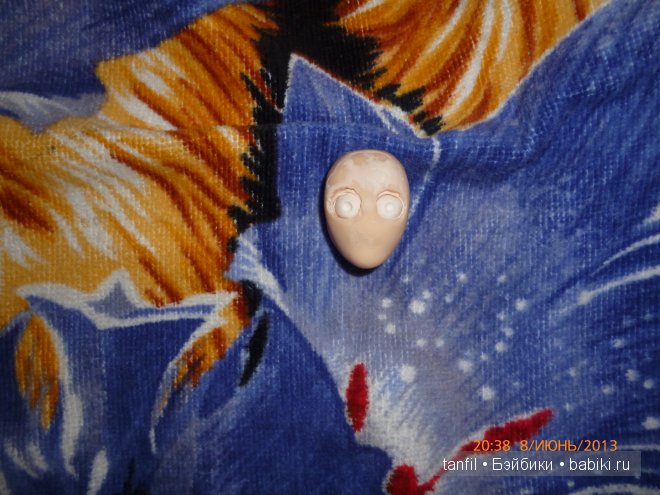
ј дальше € так увлеклась… что забыла сфотогафировать промежуточный процесс, поэтому описываю словами.
¬ырезаем в заготовке головы два круглых отверсти€, вставл€ем туда заранее приготовленые глазки, залепл€ем изнутри пластикой(на первом фото видно)и начинаем делать лицо. огда закончили, осторожно вынимаем глазки изнутри(если глазки задуманы невставные, то этот пункт пропустить).
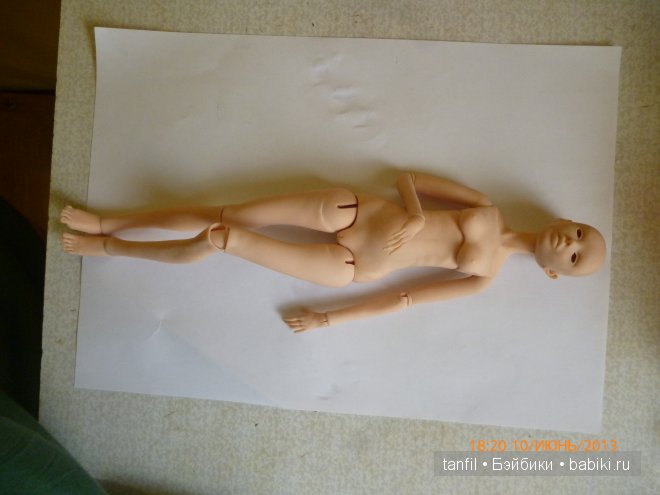
здесь уже есть все кроме глаз
«атем тонируем тело и лицо(по желанию)
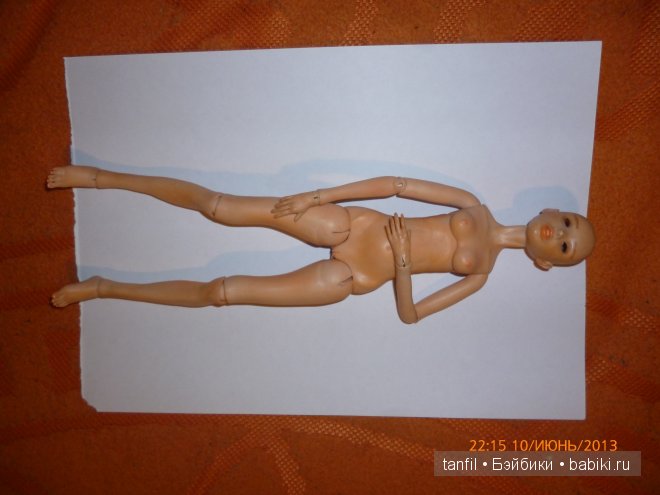
фото со вспышкой, на самом деле она не така€ блест€ща€, скорее блеск как у здоровой человеческой кожи… завтра при дневном свете еще пофотографирую.√лазки еще в процессе.¬идимо завтра поставлю и закончу мастер -класс.
“ак вот глазки.Ќа певой фото видно какие они первоночально.«атем углубление красим в нужный цет, рисуем зрачек и покрываем в несколько слоев лаком, чтоб сверху была полусфера.
вот они в невысохшем виде
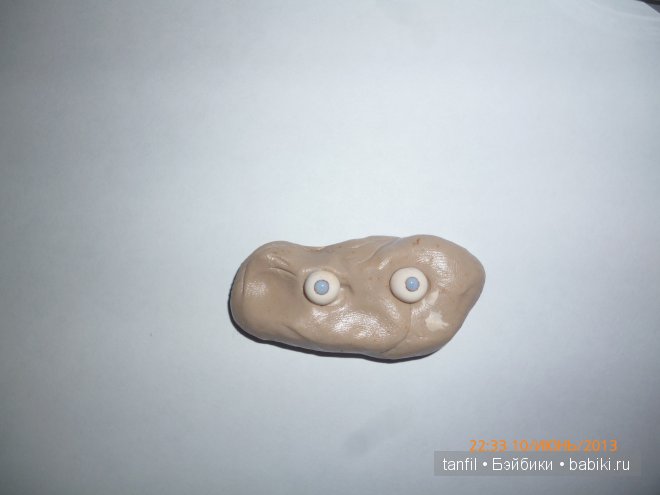
вот высохшие
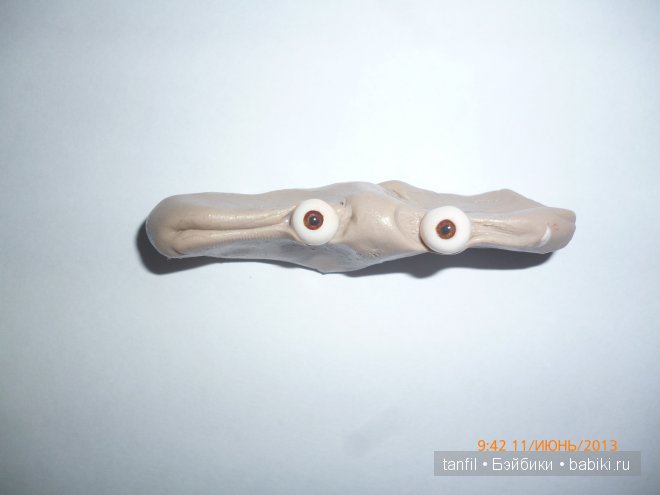
в голове у нас приготовлены вот такие углублени€ дл€ глаз
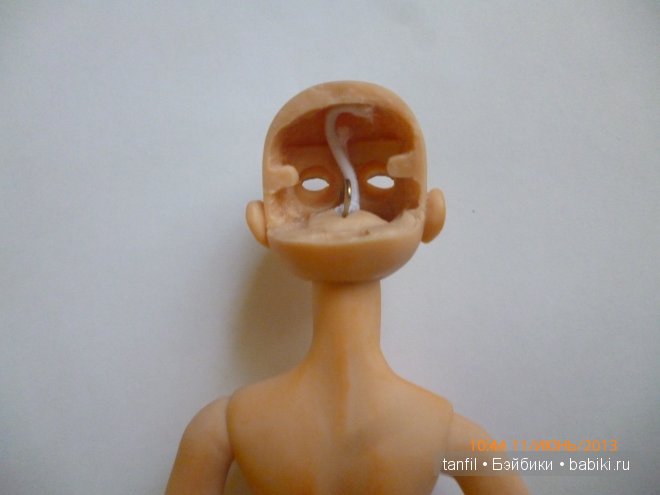
глаза вставл€ем
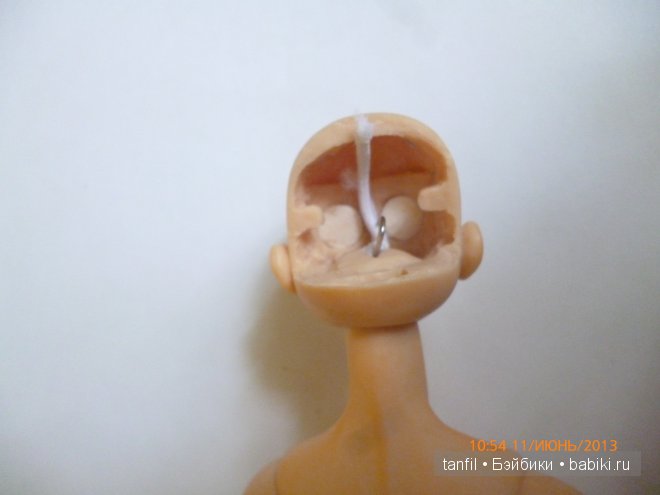
залепл€ем кусочком сырой пластики
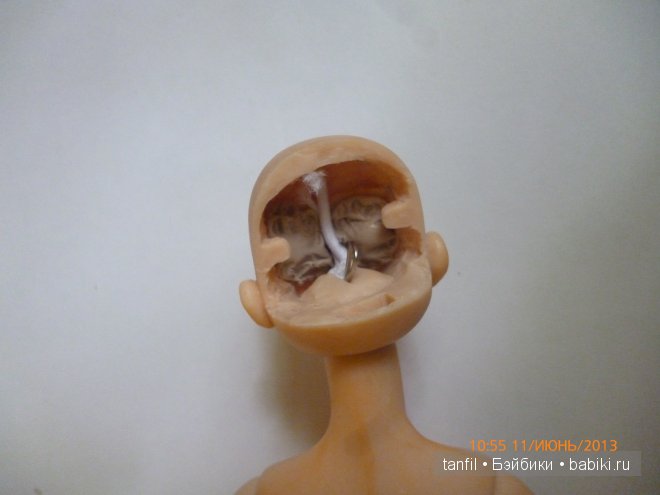
и вуал€.....))) они на нас уже смотр€т…
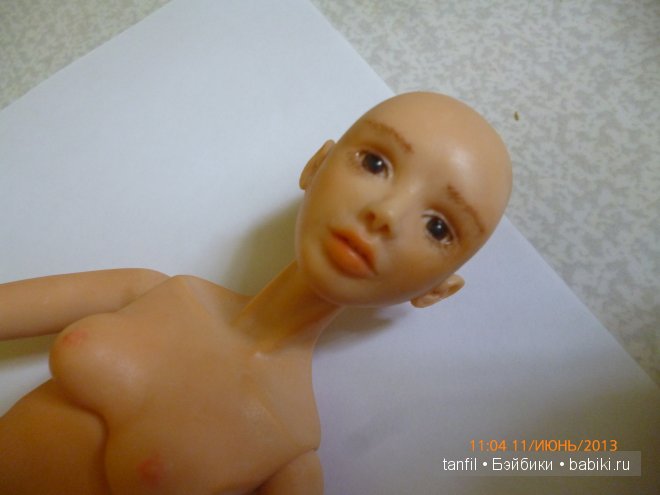
вот такие у нас ручки
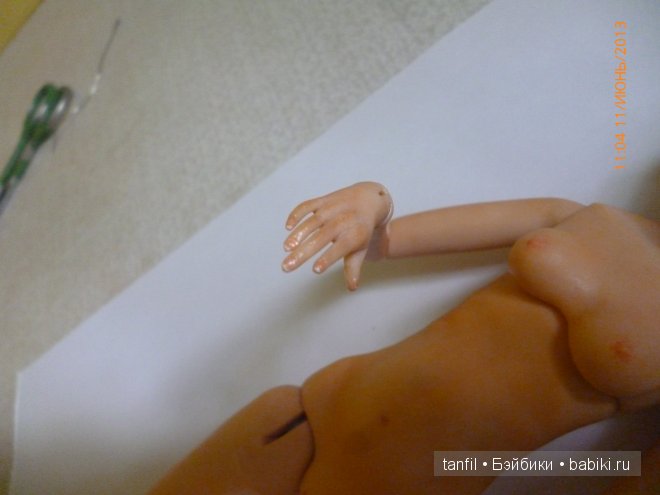
и ножки
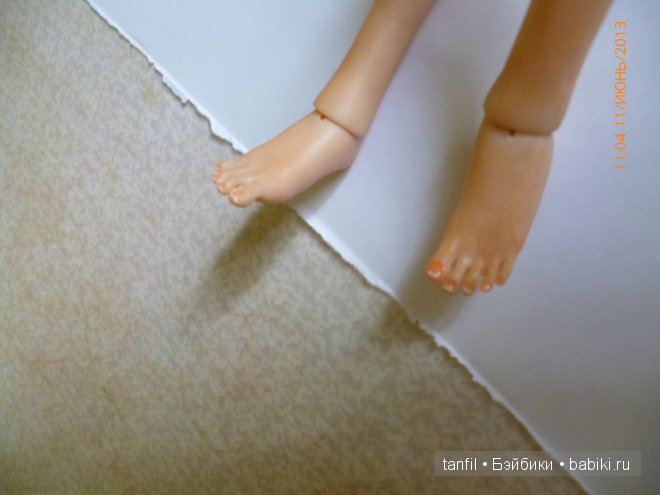
в целом
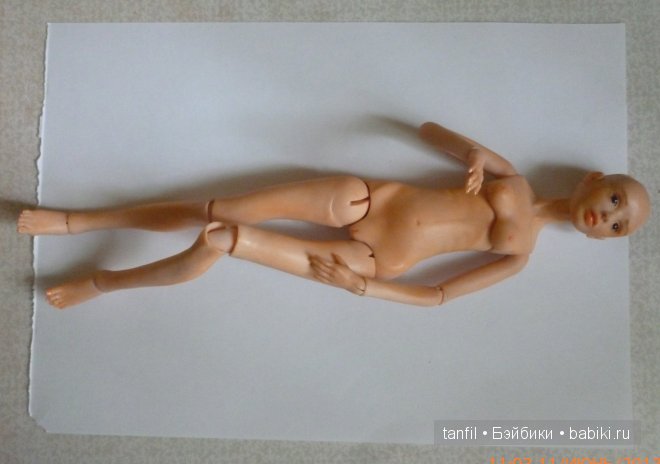
Ќу вот и закончилс€ наш мастер класс… получилось за 10 дней.Ѕлагодарю за внимание.∆елаю всем творческих успехов и надеюсь увидеть ваши топики, с вашими шарнирными куклами (надеюсь аппетит € вам нагул€ла).Ќу а теперь кто куда, а мы подбирать образ, делать топик о самой куколке и готовитьс€ к шопику)).”дачи всем!
ћетки: рукоделие |
шарнирна€ кукла |
Ёто цитата сообщени€ losik-kurnosik [ѕрочитать целиком + ¬ свой цитатник или сообщество!]
ћастер-класс по созданию шарнирной куклы. 1 часть
ћастер-класс по созданию шарнирной куклы. 1 часть
Ќу начнем. „асть перва€, дл€ мен€ сама€ неинтересна€ и даже нудна€… но без неЄ не обойтись.
—начала нужно сделать чертеж.»ли вз€ть любой готовый из интернета… типа этого.Ќо мне кажетс€ что лучше нарисовать самим… так ваша кукла будет непохожей не других, со своей авторской индивидуальностью.ѕродумать какой вы хотите видеть готовую куколку… толстенькой… худенькой… какого возраста.
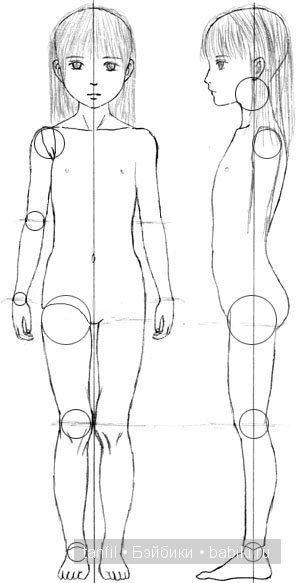
ƒл€ работы € использую в этот раз фимо пуппен миниатюра. ак всегда пищева€ фольга и несколько инструментов, которые облегчают работу.
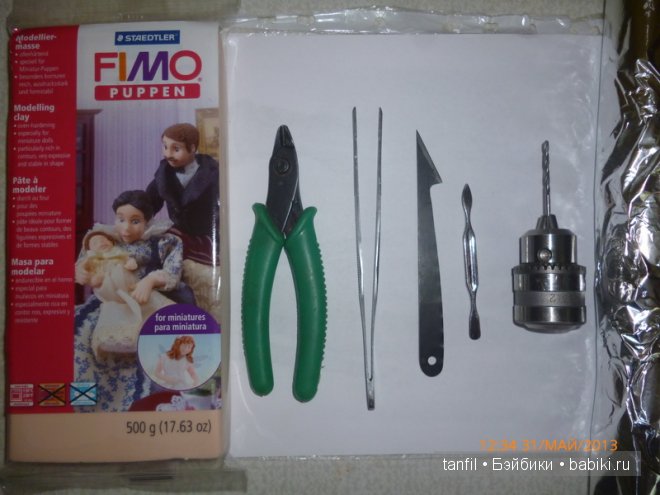
ƒелаем заготовки из фольги, врем€ от времени прикладываем их к чертежу…
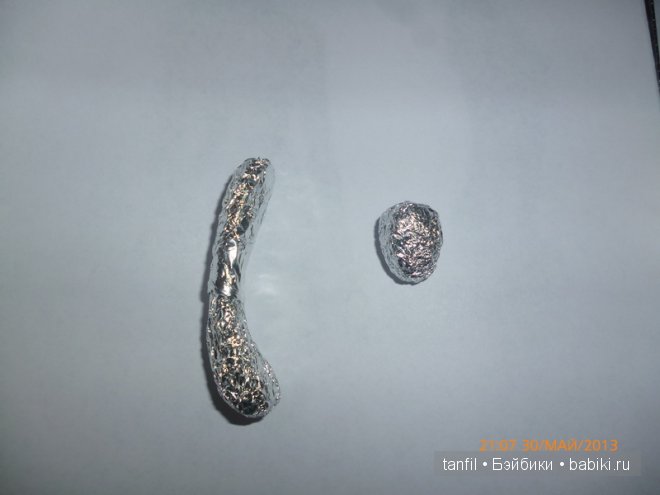
ѕридерживаемс€ размера и формы.
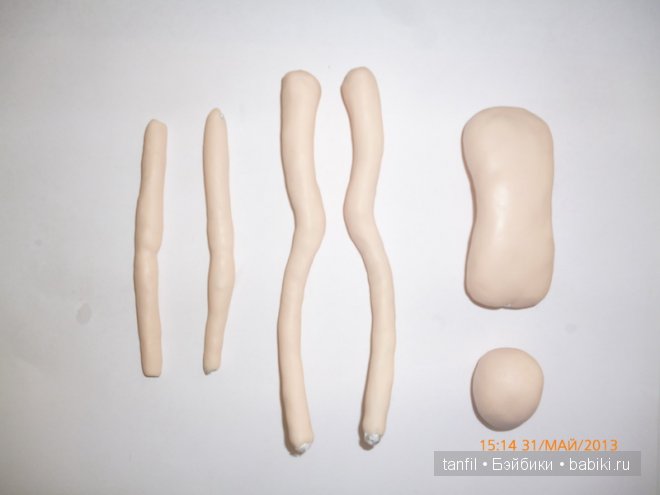
ќблепл€ем тонким слоем пластики.ѕримерно 1мм-1,5мм.»згибаем уже облепленые заготовки в нужном направлении и запекаем в духовке при температуре указаной на пачке пластики, которую будете использовать. —тавим в холодную духовку на 15-20 минут.ѕродолжение следует…
≈сли есть какие-то сильно выпуклые бугры, то нужно поправить с помочью наждачной бумаги или есть такие губки дл€ полировки ногтей, чтоб ничего сильно не выступало.“ереть не до фанатизма, а просто немного сгладить.
ƒалее начинаетс€ интересное….но сложное.«апасаемс€ анатомическим атласом и изучаем где расположены какие мышцы.ѕрекрасный вариант -посмотреть на себ€ в зеркало другими глазами…… замечательными объектами дл€ этого дела также €вл€ютс€ дети.ƒл€ моей дочери уже не будет сюрпризом если € ни с того — ни с сего скажу «покажи колени» или «покажи лопатки».ќна мне их с удовольствием продемонстрирует, а потом еще будет гордитьс€, что принимала участие в создании новой куклы))).Ѕлиже к делу.
я всегда начинаю лепить с туловища.ѕервый раз € лепила с головы и ошиблась с размером….она оказалась слишком мала. тому же черты лица будет легче подобрать если тело уже есть(это дл€ мен€ так).¬общем начинаем сверху вних держась руками за уже запеченый пластик.—вежий пластик (уже вылепленые детали )стараемс€ не трогать.¬нимание!!! Ћепим только перед туловища.«аднюю часть не трогаем вообще.» таким образом гл€д€ на себ€, детей, атлас пытаемс€ повторить.Ёто как бы трехмерное срисовывание.
ƒобавл€ем шею
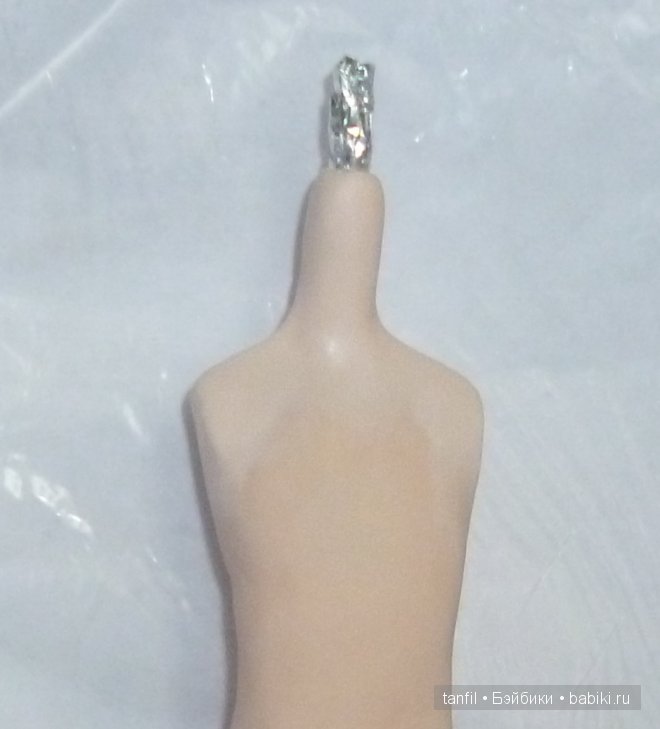
ƒобавл€ем мелкие детали и грудь
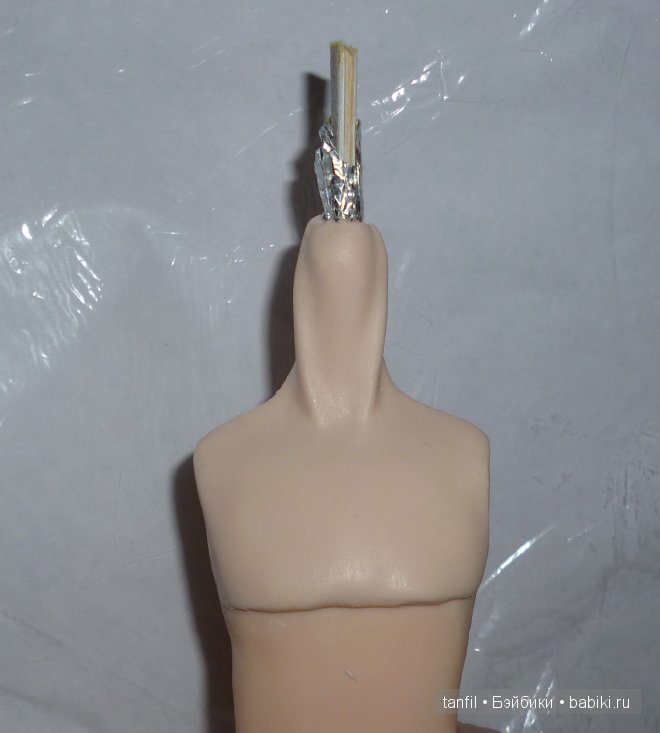
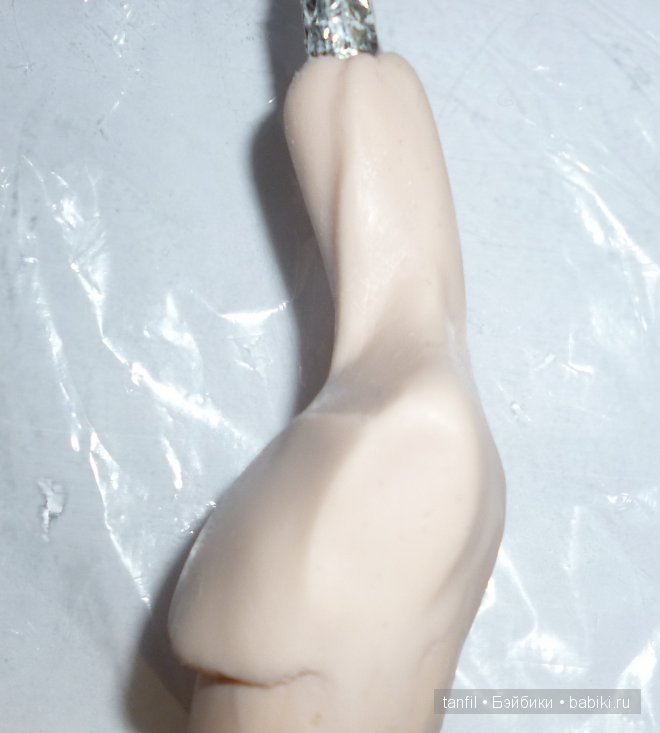
» так постепенно спускамс€ спускаемс€…
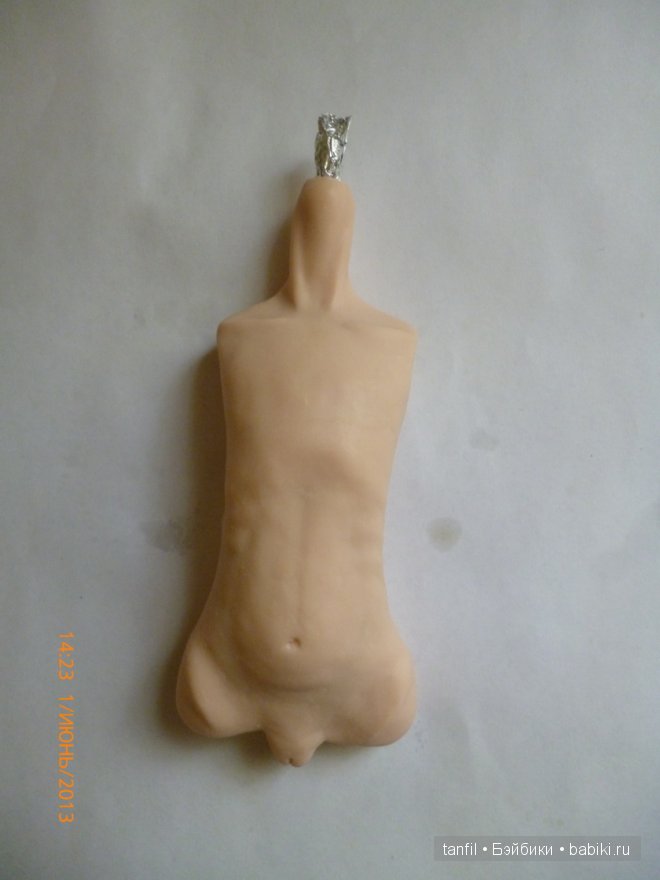
и запекаем оп€ть 15-20 минут.—тавим в холодную духовку.я это уточн€ю затем, что в гор€чую -это будет совсем другое врем€.ќстужаем.
“ак дальше… хорошенько трЄм наждачной бумагой, убира€ все неровности (трем только перед-то что делали последним)“рем на совесть.—начала крупной, потом помельче.
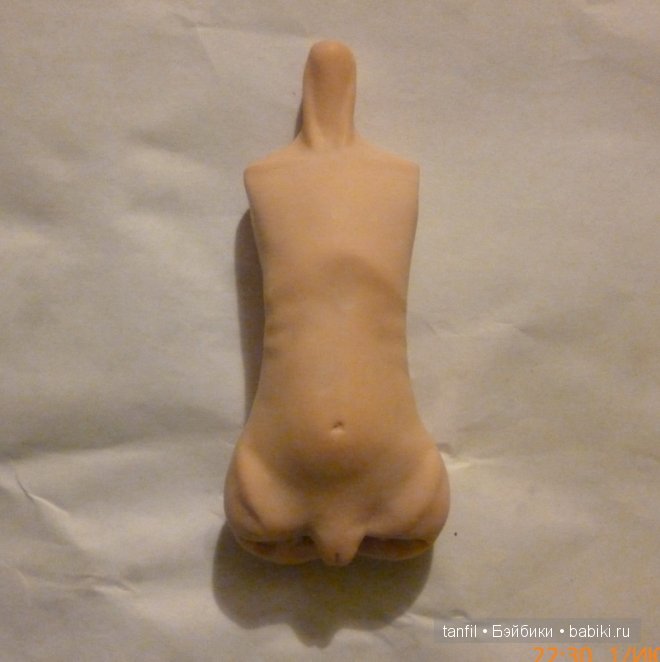
“еперь перевовачиваем и производим теже действи€ с другой стороной.ѕри этом держа за запеченую часть.
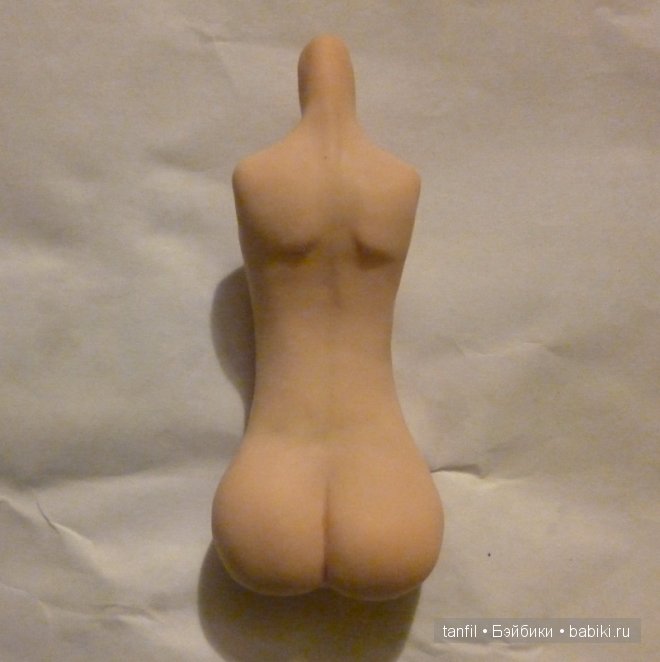
«апекаем, остужаем, трЄм.—тараемс€ соблюдать симетрию.” мен€ симетрии пока нет, но сейчас главное сделать основное, а потом можно доработать.
»з палочек делаем ножки...(извин€юсь за фон… это мой рабочий листочек, на котором € запекаю части)
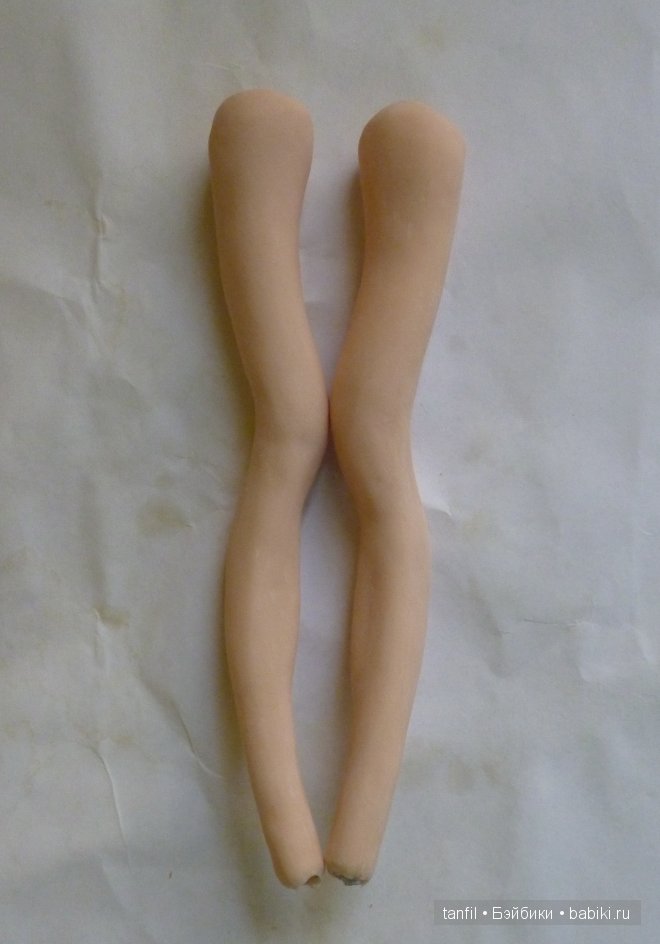
запекаем, трем… после запекани€ можно будет подправить симетрию… где-то долепить… где-то срезать
—ледующий этап… и пусть не дрогнет рука)) разрезаем тушку
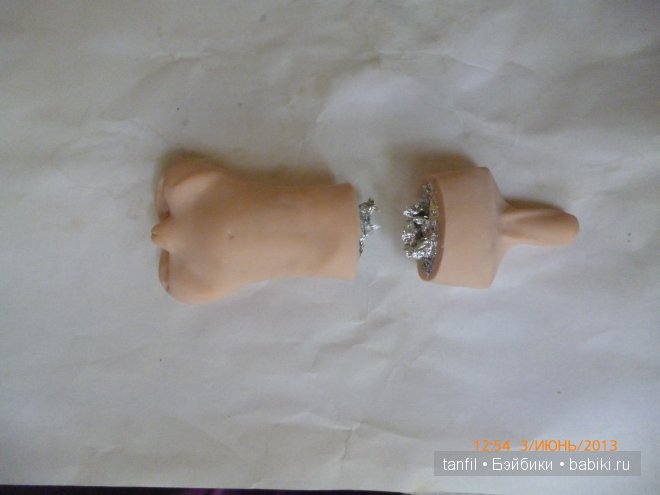
¬ытаскиваем всю фольгу, помога€ себе при этом пинцетом и другими поручными инструментами.
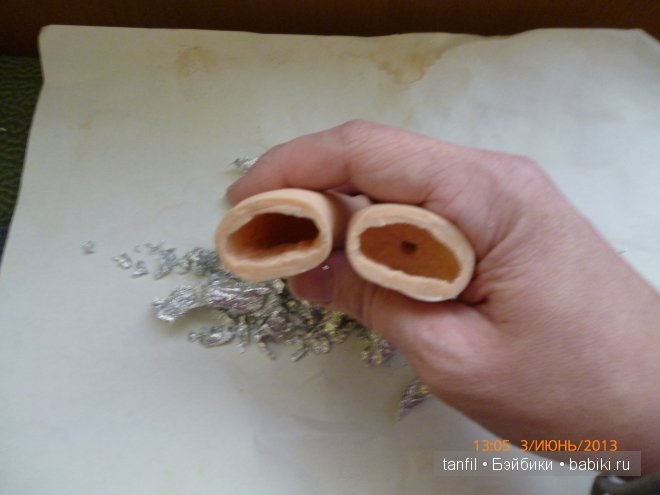
Ќемного скругл€ем кра€ нижней части и отрезаем толщину верхней части
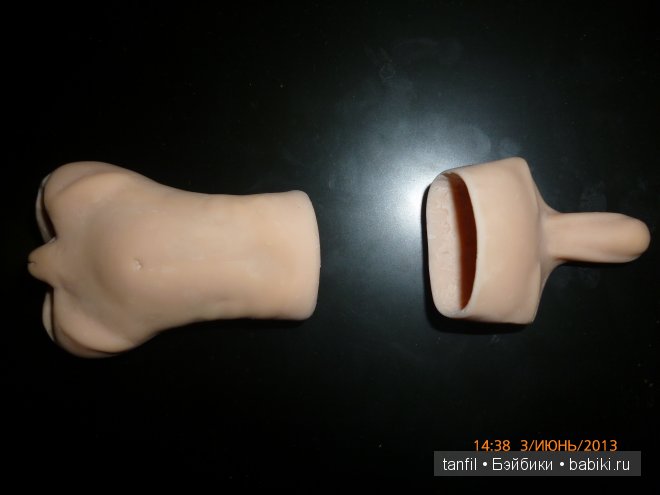
должно получитьс€ примерно так, чтобы верх немного надевалс€ на низ
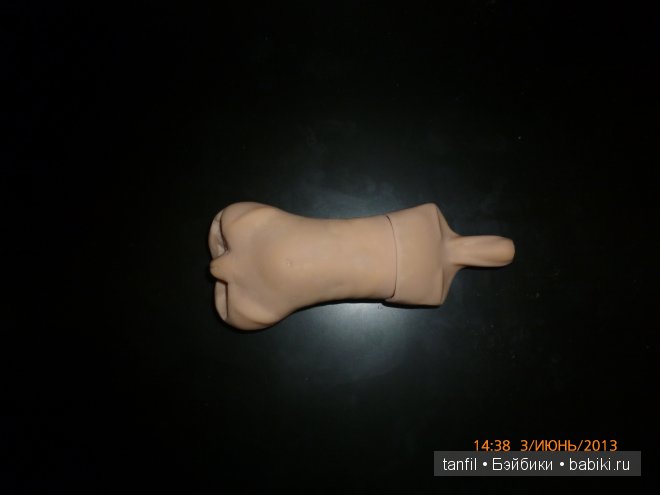
долеплеваем округлость у низа и наращиваем грудь
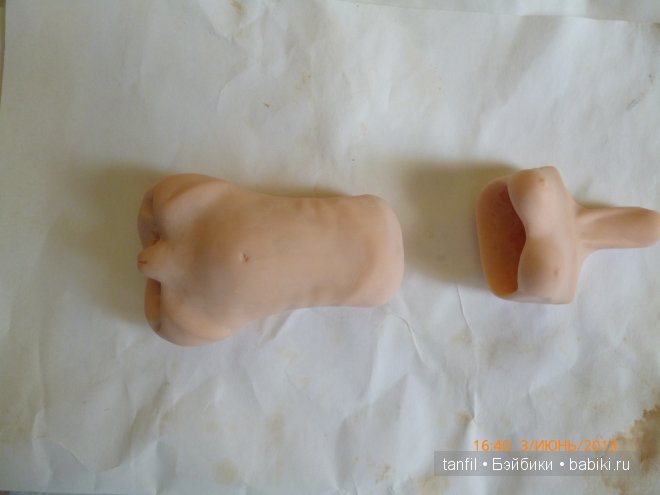
“акую модель груди € пробую делать первый раз, на каждой кукле пробую что-нибудь новое(шарниры, тип фигуры и т.д.)ј то неинрересно делать одно и тоже.
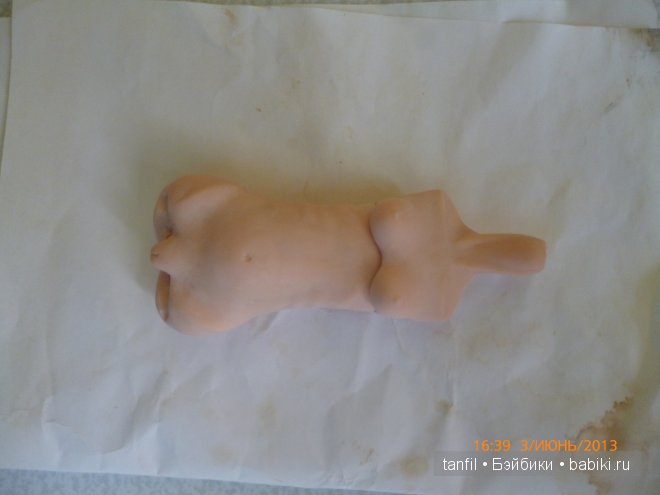
¬споминаем детство и катаем шарики
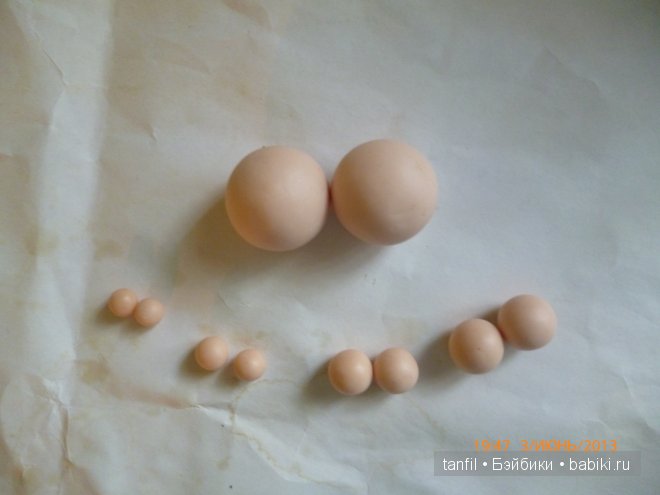
запекаем, трем немного… чтоб каждый раз на повтор€тьс€-уточню… запекаем каждый раз 15-20 минут Ќ≈ ЅќЋ№Ў≈!!! в холодную духовку.» только когда уже все будет готово, последний раз запекаем 30 минут по инструкции.ќбъ€сн€ю… если запекать дольше, то потом наждачкой тереть будет трудно.
вырезаем отверсти€ под бедреные шарниры, пример€€ шарики.
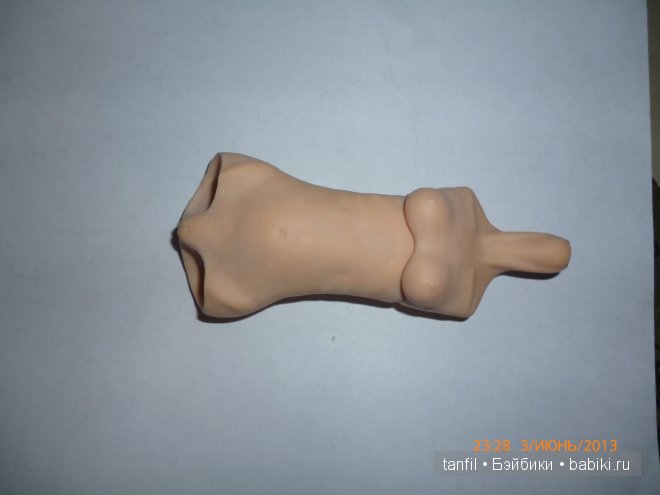
» традиционо запекаем.Ћучше запекать не по такой схеме, а копить несколько деталей чтоб запечь одновременно (дл€ экономии электричества)
Ќа данный момент мы имеем вот это.
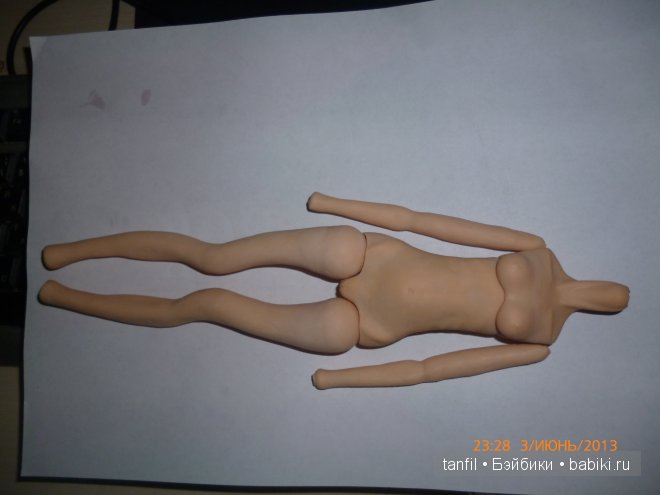
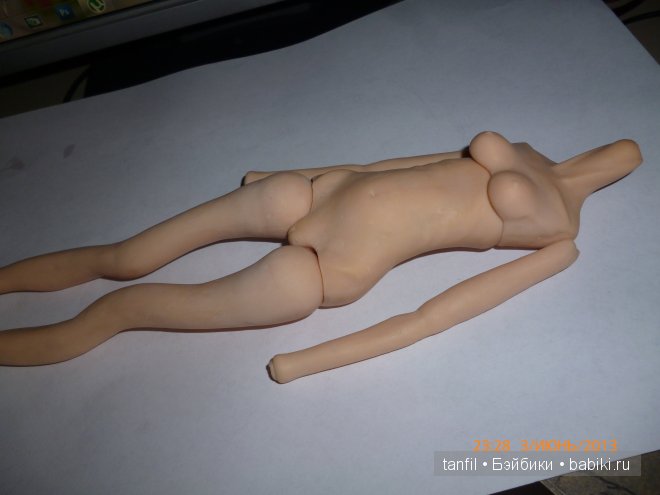
Ќо радоватьс€ рано, еще полно работы.ѕродолжение во второй части.
ћетки: рукоделие |
шарнирна€ кукла |
Ёто цитата сообщени€ Ќатуральные_камни [ѕрочитать целиком + ¬ свой цитатник или сообщество!]
нига по созданию шарнирной куклы.
ќтлична€ книга с туториалом в картинках по созданию шарнирной куклы.
¬сЄ, начина€, от рисунка и заканчива€ тонировкой и мейкингом.
ѕлюс бонус, как сделать башмачки.
ћетки: рукоделие |
шарнирна€ кукла |
Ёто цитата сообщени€ “аша92 [ѕрочитать целиком + ¬ свой цитатник или сообщество!]
ћетки: рукоделие |
| —траницы: | [1] |












